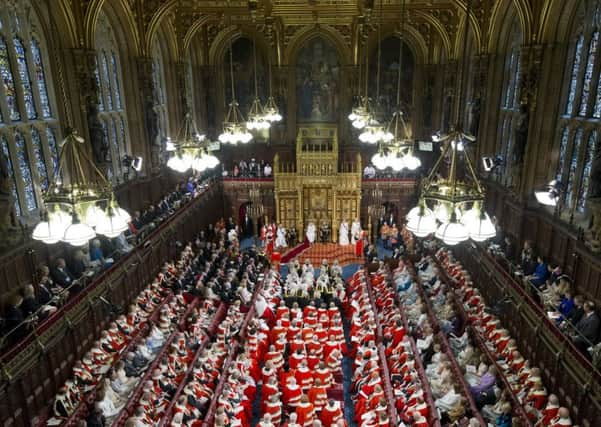Many ways to reform this institution


Me neither. But there again, I didn’t go to public school and Oxbridge, I didn’t threaten the nation with an emergency Brexit budget, I did not deliver a failed referendum campaign, and I was neither a spin doctor nor, sadly, a fashion stylist. If I had been I might have been amongst the 13 new peers and 48 other people who received gongs as a farewell gift from David Cameron.
Put aside the gongs for a moment – this is about the House of Lords (aka The Retirement Home), and the fact that during his premiership David Cameron created 245 new lifetime peerages at a quicker rate than any previous Prime Minister.
Advertisement
Hide AdAdvertisement
Hide AdIs it now time to engage in a serious cross-party debate on how best to reform this institution? I think so.
So why do we have a House of Lords?
The origins evolved from the mists of our ancient history and reach back to 11th century Saxon monarchs seeking advice from the ‘Wintangemot’ – the assembly of the wise, which comprised of powerful landowners and church leaders.
Over time this morphed into the Council of Barons following the Norman invasion of 1066, and by the 15th century it had grown dramatically in terms of legislative and administrative power. This reached a peak in the ‘Glorious Revolution’ of 1688 against King James II, which gave permanent parliamentary sovereignty to the Lords.
The Industrial Revolution in the 19th century changed society. Members of the working class were elected to the Commons and disagreement between the two houses, mainly on social issues, became more frequent.
Advertisement
Hide AdAdvertisement
Hide AdThis resulted in the Commons introducing the Parliament Act of 1911, which removed the right of the Lords to veto financial bills and, provided the Commons passed a bill twice in two years (later reduced to one year), they could not veto any bill sent up from the lower house.
Ultimate power rested, and remains to this day, with the elected Commons.
The difference in demographics between members of the House of Lords and the population in general continued to grow. In 1998 a survey found that a third of hereditary peers had not attended the house in the past year, nine out of 10 had been to public school and more than 50 per cent to Oxbridge. Further reforms removed 600 of them.
It is rare now for hereditary peers to be appointed; Denis Thatcher was one of the more recent. Life Peers are created by the Queen, hold the rank of baron and sit in the House of Lords. The honour of a knighthood derives from mediaeval chivalry.
Advertisement
Hide AdAdvertisement
Hide AdOne of the prime functions of the House of Lords is to examine, debate, and revise bills in a supposedly non-partisan atmosphere that cannot be done in the Commons, where MPs tend to follow the whip and vote along party lines. For this the Lords get paid £300 per day, plus travel expenses, even if they just clock in for a few minutes.
Once described as “the best club in London and they pay you to go”, the Lords has grown to over 800 members – the second largest unelected legislative assembly in the world after the National People’s Congress of China. In America the upper house senate has only 100 members.
There are many ways the new Prime Minister can reform the Lords, including freezing the right of a sitting Prime Minister to nominate new peers, introducing a five-year term of office, with the longest serving 100 members dropping out after the first five years and so on until the target number is achieved (400 for starters?), and devising the means to create a smaller, fully elected, more efficient, and less costly house. Your thoughts please.
Likewise, apart from awards for courage, the others must be for exceptional achievement or service, not for failure or dress sense.